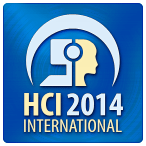HCI International 2014
T19: Brain Computer Interface
Günter Edlinger (short bio)
g.tec medical engineering GmbH & Guger Technologies OG, Austria
Max Bruckner (short bio)
g.tec medical engineering GmbH & Guger Technologies OG, Austria
Tuesday, 24 June 2014, 08:30 - 12:00
Objectives:
The Brain-Machine/Computer Interface (BCI) research area is a vital and fast expanding field. BCIs have been developed during the last years for people with severe disabilities to improve their quality of life. Applications of BCI systems comprise the restoration of movements, communication and environmental control. However, recently BCI applications have been also used in different research areas e.g. in the field of rapid cortical mapping, rehabilitation afte stroke or virtual reality. The Tutorial will discuss necessary prerequisites to successfully perform BCI experiments in non-invasive and invasive ways as well as pros and cons of the various methods. Live demonstrations of BCI control will allow to understand the progress of the technology.
Content and Benefits:
- insights into recent hardware (wireless/non wireless)for BCI research
- insights into the software for BCI research enabling participants to run their own experiments
- giving participants the chance to analyze their BCI performance
- demonstrations of applications
(smart home environment, avatar control, robot control) - discussing advantages/disadvantages of dry/wet sensors
- discussing non-invasive and invasive BCI approaches
- using BCI technologies in clinical environment
Target Audience:
The goal of the tutorial is to bring together researcher and interested audience to describe and demonstrate the options available in the field of Brain/Neural Machine Interfaces. Especially usability and reliability of BCI control allows now developing and displaying more advanced applications. We think that such a tutorial will be very well accepted from the audience working in the area of HCI combining different modalities for interactions.
Relevant links:
- State of Art in BCI research: The BCI Award 2010 book chapter
- BCI videos: New results from g.tec and many others
- intendiX: User-Ready Brain-Computer Interface Applications
Bio Sketch of Presenters:
 Günter Edlinger studied control engineering at the University of Technology Graz and carried out research work at the Institute of Biomedical Engineering (Prof. Pfurtscheller) at the University of Technology Graz. He worked there as an assistant professor and teacher and received his PhD degree in 1998. The topic of his PhD work was the design of a High Resolution EEG. He is co-founder of gtec. He is responsible for R&D with special emphasis on the development and production of medical systems since more than 16 years.
Günter Edlinger studied control engineering at the University of Technology Graz and carried out research work at the Institute of Biomedical Engineering (Prof. Pfurtscheller) at the University of Technology Graz. He worked there as an assistant professor and teacher and received his PhD degree in 1998. The topic of his PhD work was the design of a High Resolution EEG. He is co-founder of gtec. He is responsible for R&D with special emphasis on the development and production of medical systems since more than 16 years.
 Max Bruckner studied medical engineering at the university of applied sciences in FH Linz. He carried out research work in the field of eye-tracking and motion. Since 2009 he is working with g.tec also in the area of Brain-Computer interfaces.
Max Bruckner studied medical engineering at the university of applied sciences in FH Linz. He carried out research work in the field of eye-tracking and motion. Since 2009 he is working with g.tec also in the area of Brain-Computer interfaces.

